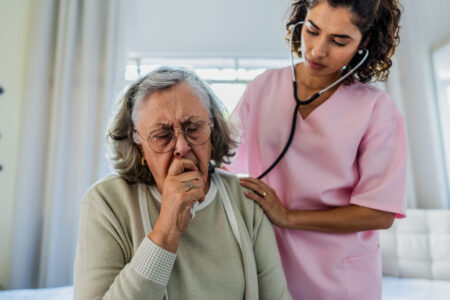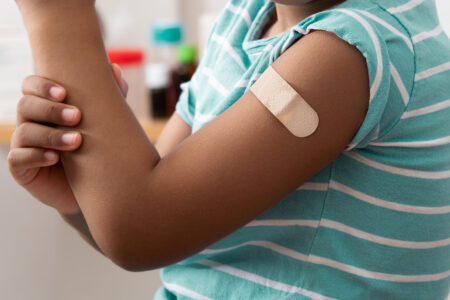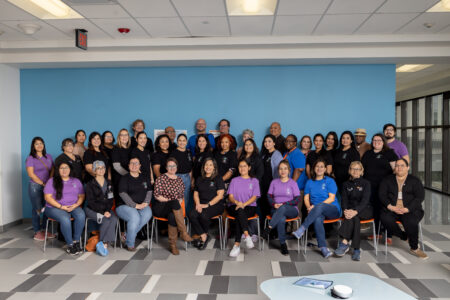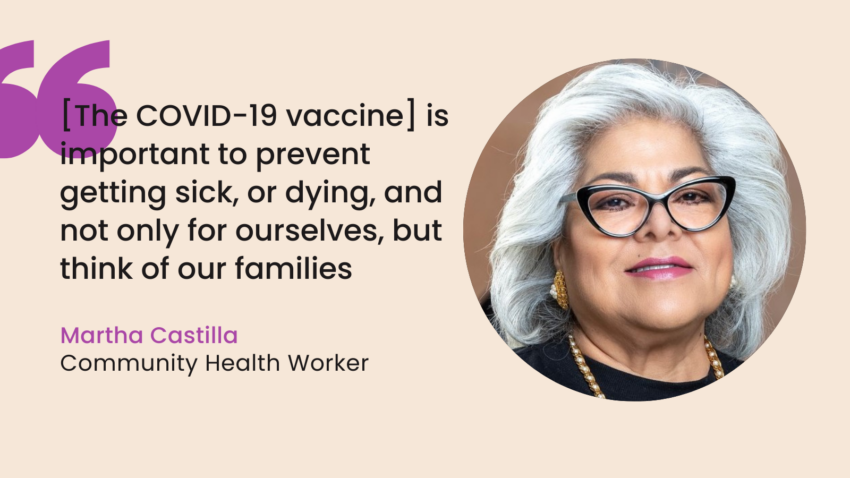
Share On Social!
Martha Castilla loves helping people.
Her compassion started as a young girl, as her family came to San Antonio from Mexico.
“I started helping my brothers and sisters when we got to this country because they didn’t speak English,” Castilla said.
Today, Castilla works as a promotora de salud, or a community health worker, educating the Latino community about health and wellness.
That includes getting the COVID-19 vaccine herself – and sharing how others can, too.
COVID-19 vaccines are available and free for adults and children, and they’re the best way to protect yourself and your familia against the worst outcomes of the virus.
Because, when the pandemic hit, Latinos like Castilla were on the front lines.
“I remember when we went to get the certification [to become a community health worker], a professor told us, ‘If we ever have a pandemic, you’re the first ones that are going to be called,’” Castilla said.
Learning to Take the Lead
Before becoming a promotora, Castilla didn’t see herself as someone who could lead in the community. But still always intrigued by the medical field and wanted to help others.
It wasn’t until Castilla became a part of her children’s after-school family program that she learned about community work.
“I started seeing the opportunities for helping people and how many people that did not work in [health] establishments were helping. I realized this is important work,” she said.
So, Castilla sought to become a promotora.
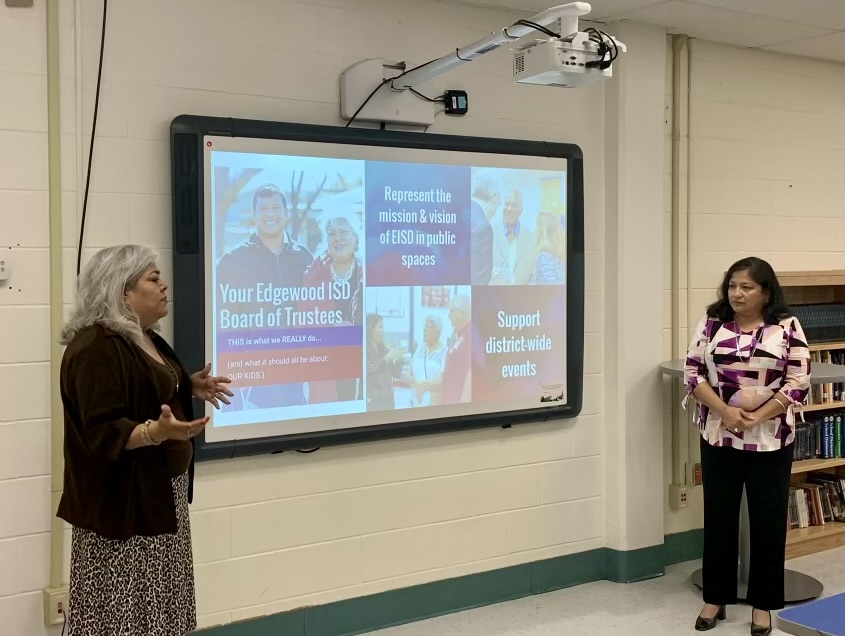
She completed the Community Health Worker certification program at Northwest Vista College in San Antonio.
The program prepares students to work as Texas State certified Community Health Workers (CHWs) for local/state public health agencies, nonprofits, and other healthcare organizations. The program was established with the help of Dr. Amelie G. Ramirez and her team at the Institute for Health Promotion Research at UT Health San Antonio, the team behind the Salud America! national program.
Castilla now has worked for several years as a promotora.
Beyond her own work, she also instructs other promotoras in South Texas through the South Texas Area Health Education Center Program at UT Health San Antonio.
The Impact of the COVID-19 Pandemic
In March 2020, the COVID-19 pandemic hit and changed our lives.
For Latinos, COVID-19 worsened the health issues the community was already facing.
Castilla saw how Latino communities were impacted first-hand, with many not having access to proper PPE like masks or knowledge about proper hand hygiene.
Because of this, Martha and her fellow promotoras began to connect people to resources.
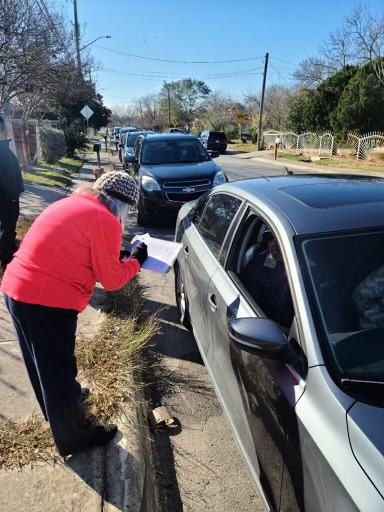
“Thankfully, we started getting masks and checked themselves to sites where they could go [for testing],” she said. “That’s why I admire the community health workers, because while everybody was home scared, and all this, we were the ones out there.”
Castilla went even further to help people amid the pandemic.
She passed out food boxes throughout the community with the help of her colleague, who grew vegetables in her garden.
Similarly, when it came to registering people to get the COVID-19 vaccine at local vaccination sites around the city, Castilla began taking down names and numbers from her home to help those in her community register.
“To me those two things in a time of desperation in the nation. Those two things to have food for people and registering for the vaccine, that was very important,” Castilla said.
The Importance of COVID-19 Vaccination
Castilla practices the health promotion that she preaches.
That’s why, as she shared health information to prevent the spread of COVID-19 in the community, she got the COVID-19 vaccine, too.
“I’ve had diabetes, high blood pressure, all that for a long time and that’s why I [got vaccinated],” Castilla said.

Castilla continues to educate and encourage those in her community to get the COVID-19 vaccine.
“I just wanted [the community members] to see how the process was and to spread the word. Because after I [registered them] here in my house, people will come and knock, ‘When are you going to register again,’” Castilla said. “And I would send them you know, go register here call here, and it was just helping them with the outreach and me delivering something to my neighborhood.”
Castilla did face a lot of incorrect information, which is a threat to public health.
Through this, she did what she could to educate others on the vaccine. She also asked doctors to come into the community to explain why getting the vaccine is important.
“I asked [doctors to come] to the community, at the school, and teach people from the school and CHWs on what’s going on, what are the facts, so that we can get rid of the misinformation and disinformation,” Castilla said.
Today, despite the height of the COVID-19 pandemic being over, Castilla’s message remains the same.
“[The COVID-19 vaccine] is important to prevent getting sick, or dying, and not only for ourselves, but think of our families,” Castilla said. “Because a lot of pain was left with the families from what we went through when the pandemic was stronger, the effects it had on the families and the memories that they have. It was very difficult.”
Castilla also stressed that people should rely on factual data.
“Don’t be close minded about [the vaccine]. Don’t believe all the incorrect information out there,” she said.
How You’re Covered Against COVID-19
Fortunately, the COVID-19 vaccine is available for free for adults and children, according to the You’re Covered website.
Use Vaccines.gov to find a location near you.
Then call or visit their website to make an appointment.
Find additional vaccine information on the You’re Covered website in English and Spanish.
Dr. Ramon Cancino, a family medicine physician at UT Health San Antonio and leader of the UT Health Physicians Primary Care Center, stressed the importance of getting vaccinated.
“If we have enough folks who are vaccinated in our community, it’ll protect everybody else, too, because transmission and infection rates would be decreased amongst those patients, which would decrease the risk for everybody else,” Cancino said.
Still Undecided on COVID-19 Vaccination?
To encourage Latinos to get vaccinated, Salud America! is sharing stories of real Latinos who are squashing incorrect information and getting vaccinated.
Learn more about Rosa Herrera and her experience with getting vaccinated.
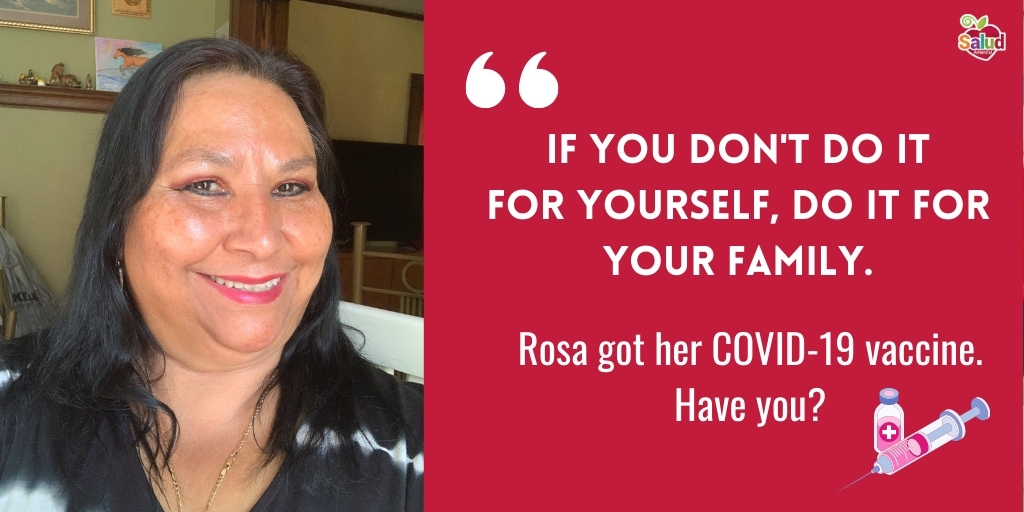 Rosa was hesitant to get the COVD-19 vaccine after reading incorrect information on Facebook.
Rosa was hesitant to get the COVD-19 vaccine after reading incorrect information on Facebook.
However, after COVID-19 hit close to home, causing her children to become hospitalized, and several of her other family members getting vaccinated, Herrera began to reconsider.
After more research and consideration, Herrera decided to get vaccinated.
Now, Herrera helps others schedule vaccination appointments!
“I tell them, ‘I already did it, you can do it! Nothing is going to happen to you. Nothing happened to me,” Herrera said. “But then at the same time, I let them know that everybody reacts differently because, we’re not all the same. But I think it’ll be better for them to get the vaccine to protect themselves, but mainly for their family members.”
Find COVID-19 vaccination locations near you in English and Spanish.
Editor’s Note: Salud America! at UT Health San Antonio is a partner in the “You’re Covered” campaign of the COVID-19 Vaccine Education and Equity Project, led by the Alliance for Aging Research, Healthy Women, and the National Caucus and Center on Black Aging.
By The Numbers
142
Percent
Expected rise in Latino cancer cases in coming years
This success story was produced by Salud America! with support from the Robert Wood Johnson Foundation.
The stories are intended for educational and informative purposes. References to specific policymakers, individuals, schools, policies, or companies have been included solely to advance these purposes and do not constitute an endorsement, sponsorship, or recommendation. Stories are based on and told by real community members and are the opinions and views of the individuals whose stories are told. Organization and activities described were not supported by Salud America! or the Robert Wood Johnson Foundation and do not necessarily represent the views of Salud America! or the Robert Wood Johnson Foundation.

